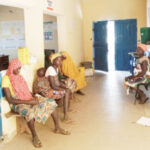The cost of acquiring accommodation in Abuja, the Federal Capital Territory FCT, has taken a new dimension as a result of forced relocation by the communities especially in Bwari, an FCT area council that shares boundaries with Nasarawa, Kaduna and Niger states.
Abuja is characterized by the high cost of renting property due to the influx of all categories of personalities from various professions. The recent banditry activities bedevilling some of its area councils worsen the issue.
Investigation by the Daily Trust revealed that communities around Bwari Area Council were worse affected by the exodus, followed by Kuje and Abaji, which are the three of the six FCT area councils where there are high incidents of kidnapping.
While residents of the rural communities relocate to Bwari and Kuje towns for instance, some individuals from those towns with means move to areas close to Abuja, such as Kubwa as well as Gwarimpa, Jabi, Utako, Wuse, and Garki in the city centre.
- Gaza war: South Africa accuses Israel of ignoring ICJ’s ruling
- FG, UNICEF, WHO to tackle variant polio virus in Kebbi
Daily Trust reports that property agents are under pressure from desperate clients to secure houses for them, a situation that has led to skyrocketing of rent around the communities.
A property agent based in Kubwa, Lawal Shehu, said most of the clients he relates with recently are coming from Bwari, and want to relocate to neighbourhoods around Kubwa.
He said the rate of renting property has spiked with a one-bedroom flat costing between N700,000 and N800,000 per annum, while two-bedrooms go for between N1.2 million and N1.5 million respectively.
“The landlords are exploiting the opportunity, and the worst aspect of it is that the demand is quite higher than the supply, as there are many clients that could not get the houses they desperately want.
“As I am talking to you now, I can only provide 10 houses, out of about 40 requested by individuals that had engaged me to look for houses for them,’’ Shehu added.
Another property agent in Bwari town, Musa Lema, said the situation is alarming as many people are either migrating in or relocating even from the town to the city centre.
He said many residents of communities like Tokulo, Kawu and Dokoma in Bwari Area Council, as well as Garam and Ijah-Gwari in Niger, or Iddah in Kaduna State, are relocating to Bwari town in droves out of fear of becoming victims of bandits’ attacks.
He said the relocating people are desperately looking for houses to rent, although many have not succeeded in getting one.
Speaking about the situation, the Chairman of the Market Traders’ Association in Bwari, Shehu Muhammad, said a number of their members from the Garam community in neighbouring Tafa Area Council in Niger State, no longer sleep in the town. “There is my neighbour inside this market from that area who has been passing the night inside a mosque in Bwari town for some time now, while one of his wives and her two children are squatting at a family member’s house, as he couldn’t get house to rent.
His second wife has left for her family house in Sabon-Wuse town in the council, pending when he could succeed in getting house in Bwari, said the trader’s chairman.
He lamented about how traders in the market are losing patronage, as according to him a number of the well-to-do individuals who make the bulk number of their customers, are relocating from the town to other more peaceful locations, like Kubwa, or Gwarimpa districts in the FCT.
Also speaking, a victim of abduction from Mpape town also in Bwari Area Council, David Peter, said many of the people looking for alternative settlements are doing so as a last option in order to avoid failing into a similar experience of being abducted, or any member of their family.
He said many people living in his neighbourhood have left their beautiful homes out of fear and relocated to locations like Nyanya in the FCT, and Mararaba town in neighbouring Nasarawa State.
He added that his children, who were abducted along with him, could hardly pass their night peacefully, as some of them were experiencing nightmares in their sleep and remained awake thereafter.
“So, I decided to send them back to my hometown, which I consider relatively peaceful, Peter added. He said the neighbourhood where he lives, could best be described as a deserted location now with most of its buildings under lock and key.
It has negative implications on economy and socially – Expert
A security expert who preferred to remain anonymous said the development has economic, social and security implications. “People moving en masse will choke up the urban areas, or centres, which leads to the overstretching of facilities and services.
When people are crammed together, they would stretch the available facilities and render them unfunctional. At the same time, they would create a vacuum in the places they left, thereby paralysing small businesses around the deserted places.
“In the security aspect, when the attackers have discovered that they could no longer find the people that they are looking for, then there is the possibility that they would equally start making an incursion into those urban areas where the people have relocated.
“People are supposed to be expanding, through which additional goods and services would be created for the growing populace. Just in the recent past, no one was thinking that such people could dare to come close to Abuja and be doing what they are doing now, killing and maiming people at will, and forcing them out of the suburbs,’’ he said.
He charged government at various levels to step up sustainable security measures capable of dealing with the menace.
“It must be sustainable one, as those people have their intelligence too, and when the government gets relaxed, they would bounce back and strike again. This would restore the citizen’s confidence and save the economy from total collapse. The way things are going now, there is no how the small and medium economy can flourish, let alone to woo foreign investors,’’ the expert said.

 Join Daily Trust WhatsApp Community For Quick Access To News and Happenings Around You.
Join Daily Trust WhatsApp Community For Quick Access To News and Happenings Around You.


